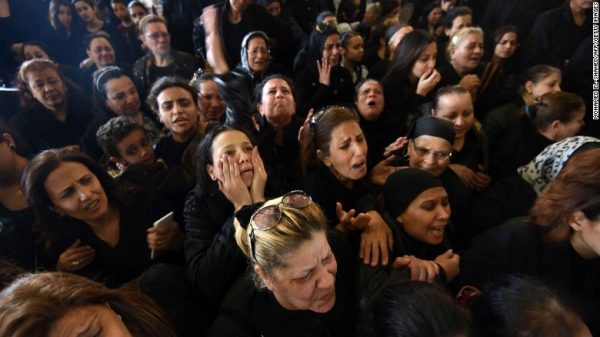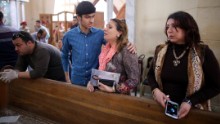
A day after brazen ISIS attacks killed dozens at two Coptic Christian churches on Palm Sunday, Egypt declared a three-month state of emergency, a measure designed to help authorities root out the killers.
A stunned nation watched funerals for victims of the bombings on national TV and citizens raised questions and fears about what some consider lax security at churches..
“The state of emergency means absolutely nothing to me,” said Andrew Abdel Shaheed, an Egyptian Copt in Brussels.
“It means that people will get trailed for no reason and arrested with no warrants, but what does it do for the future of Egyptians? I personally do not feel safe to return to Egypt.”
The Sunday strikes, which targeted Egypt’s persecuted and vulnerable Christian minority on the first day of the faith’s Holy Week leading up to Easter, left at least 49 dead, state TV said Monday.
At least 27 people died in a bomb blast inside a church in the northern city of Tanta, and 78 people were injured, according to Egypt’s state-run news agency Al-Ahram.
In Alexandria, 18 civilians and four police officers were killed when a suicide bomber blew himself up outside a Coptic church, Al-Ahram said.
ISIS, which claimed responsibility, warned of more attacks in a statement. “The Crusaders and their apostate followers must be aware that the bill between us and them is very large, and they will be paying it like a river of blood from their sons, if God is willing,” the group said in Arabic.
After the bombings, Egyptian President Abdel Fattah el-Sisi declared a period of mourning. The government formed a council to counter terror and extremism and announced a three-month state of emergency.
“The attack will not undermine the resolve and true will of the Egyptian people to counter the forces of evil,” the President said in a statement.
In a statement issued on the Telegram messaging platform and circulated by several ISIS supporters, the militant group identified the bombers as Egyptian nationals. Egyptian authorities have not confirmed the bombers’ nationalities.
The first blast ripped through a Palm Sunday service at St. George’s Church in Tanta. An explosive device had been planted under a seat in the main prayer hall.
News footage from Tanta showed people gathering at the church, singing hymns. The video then quickly switched to bars as harrowing screams and cries echo in the background.
Victoria Michell, whose father was killed in the attack, described a scene of horror when the explosive detonated.
“A lady next to me lost her eye. Other people were cut to pieces; blood and body parts were everywhere. The choir was also dead on the floor. The chandelier above me crashed to the floor,” she said.
Not long afterward, a suicide bomber attacked outside St. Mark’s Coptic Orthodox Cathedral in Alexandria, according to state news outlets.
Police officers who had been posted outside the church stopped a man wearing an explosive belt from entering the church, the Interior Ministry said. Two of those officers, a man and a woman, were killed, along with civilians and other police staff.
‘Security is very weak’
After the attack in Tanta, authorities replaced the provincial police chief amid anger and frustration over the attacks.
Citizens in Tanta told CNN they believe security is poor and demanded it be changed. They say church security guards are ineffectual.
“Security is very weak and they are falling short of their duty. How can someone plant an explosive inside the church? Why didn’t they search him?” said Amel Roushdi, who is Christian.
“We don’t know the old security chief and we won’t know the new one,” she said.
Despite the violence, she said she won’t be intimidated.
“I will not abandon the church. We are a generation that won’t leave the church or Egypt.”
Mo’men Ahmed Fouad, a 17-year-old Muslim, had been near the church in Tanta when he heard a loud blast. He later entered the sanctuary and saw a scene of devastation.
“I don’t feel secure at all. Muslims and Christians have always lived together and coexisted. I would like security to be intensified,” he told CNN. “How could someone enter a church to do this?”
In Alexandria, caskets arrived at a collective funeral in the Marmina (St. Mina) Monastery on the outskirts of the city. “They are martyrs,” mourners said. “They are with God now.”
At one juncture, mourners made their displeasure know to security officials who came to pay their condolences. Tight security was forged around and checkpoints were established near the monastery, on the western outskirts of Alexandria.
A persecuted minority
Copts in Egypt have faced persecution and discrimination that has spiked since the toppling ofHosni Mubarak’s regime in 2011. Dozens have been killed in sectarian violence. In December, an attack at a Coptic church in Cairo killed 25 people.
Coptic churches and homes have been set on fire, members of the Coptic minority have been physically attacked, and their property has been looted, rights group Amnesty International reported in March.
Coptic Christians make up about 10% of Egypt’s population of 91 million. They base their theology on the teachings of the apostle Mark, who introduced Christianity to Egypt. Tanta is roughly 60 miles (96 kilometers) north of Cairo, in the Nile delta.
International condemnation
Pope Francis is scheduled to visit Cairo this month. He will meet with various religious leaders, including the head of the Coptic Orthodox Church.
Along with others, the Pope expressed his grief after the church attack.
US President Donald Trump, who welcomed Sisi to Washington last week, expressed his support for Egypt. On Sunday, Trump called Sisi from Air Force One to offer his condolences, a senior administration official told CNN.
Trump condemned the attacks via Twitter and said he has “great confidence Sisi will handle the situation properly.”
UN Secretary-General António Guterres condemned the attacks and offered his sympathies to the victims and to the country in a statement through a spokesman. The US State Department also issued a rebuke, calling the bombings “barbaric attacks on Christian places of worship.”
Israeli Prime Minister Benjamin Netanyahu tweeted Israel’s condolences and hopes that the wounded make a swift recovery. “The world must unite and fight terrorism everywhere,” he said.
CNN


Leave a Reply
You must be logged in to post a comment.